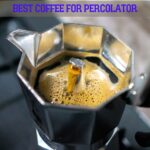Best coffee for percolator. Whether you’re an experienced percolator or just starting out, here you’ll find everything you need to know about finding the best coffee for your beloved brew machine. From selecting the right grind size to choosing the perfect beans, we’re here to help make sure your morning cup of joe tastes absolutely delicious!
What is a Percolator?
A percolator is a type of coffee brewing device that uses heated water vapor pressure to extract flavors and aromas from ground beans. Generally, the paper or metal filter found on most coffee makers does not work with a percolator, as these can potentially add an undesired taste and texture. The espresso-like, strong brew that comes from a percolator is often used to make cafe au lait, cappuccino, and other unique coffee drinks.
When shopping for coffee for your percolator, it is important to look for high-quality beans with medium to dark roasts so that you can get the best flavor from your coffee maker. You will also want to think about grind size; lighter roast coffees need finer grounds to create bolder flavors, while darker roasts require more coarsely ground beans in order to allow their naturally sweeter notes to come through. Lastly, be sure to use clean filtered water in order for your brews to taste clear and without any impurities!
Type of Beans to Use
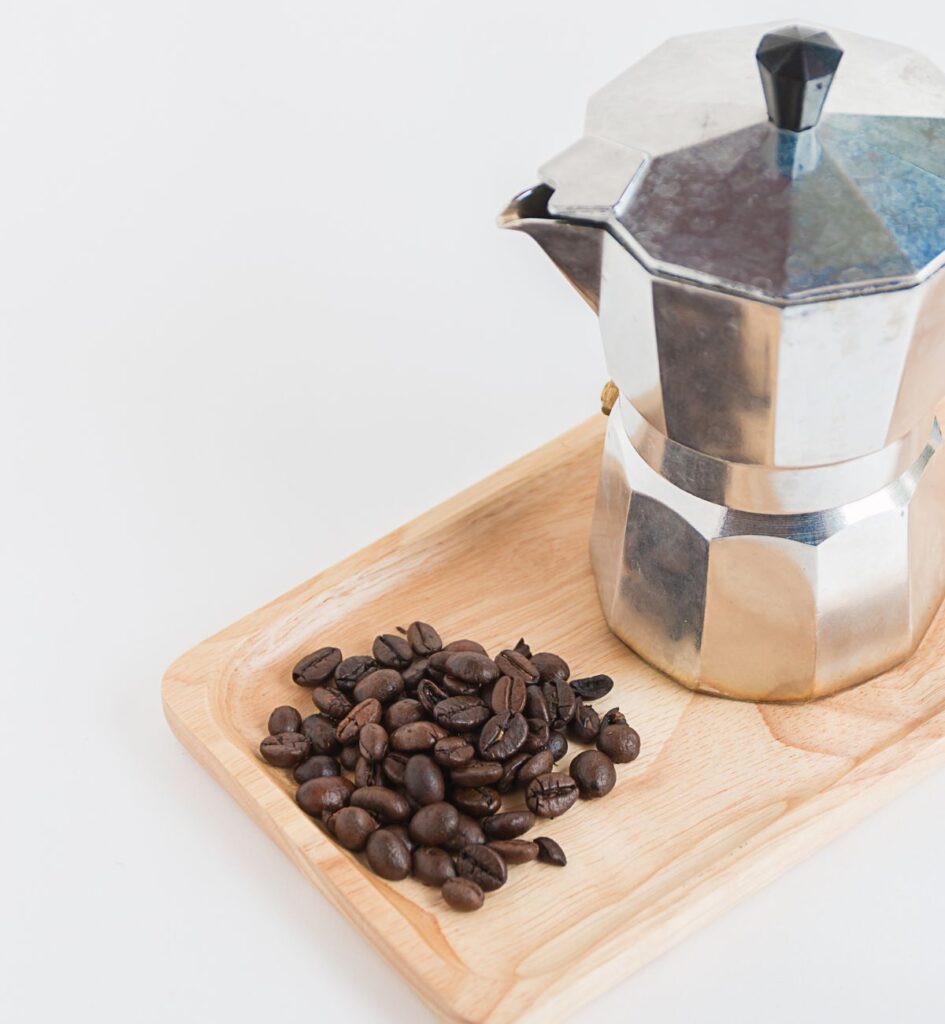
Using the right kind of beans for your percolator is essential for producing a delicious cup of coffee. Generally, lower-quality beans, such as those found in grocery stores, produce poor results in a percolator. Rather than using pre-ground coffee, it is best to use freshly ground whole beans as they will ensure maximum flavor. Also, lighter roast coffees tend to be more suitable for percolations due to their higher acidity and sharper flavors.
When selecting your coffee beans, look for high-grade Arabica varieties grown in countries like Colombia, Ethiopia, or Peru at high altitudes. Some recommended beans would be Colombian Supremo, Guatemalan Antigua, or Ethiopian Sidamo beans. All are considered excellent choices, and it often comes down to personal preference when selecting the right bean.
For those who prefer organic options, you can look into brands like Mount Hagen organic decaf or Java Planet organic blends – both of which are highly recommended by buyers on Amazon reviews. No matter what type of bean you choose, always go with freshly roasted and high-quality beans to make sure that you get the most out of your percolator brewing experience!
Pre-Ground vs. Whole Beans
When it comes to making good coffee with a percolator, you must decide whether you’d like to use pre-ground or whole beans. While there are certainly benefits to both, the preferred choice for a percolator is usually whole beans. This is because the grinding process can affect your coffee’s flavor – if the grind is too fine, it can become bitter and produce an overly strong flavor; if it’s too coarse, your cup may taste weak or watery.
The key to great-tasting coffee from your percolator is consistency when grinding. You want to achieve an even grind every time so that all grounds are about the same size and release their flavors at an even rate throughout your brew time. Using pre-ground coffee can be challenging to achieve this balance, so many consumers prefer using fresh whole beans instead.
Also, keep in mind that wide non-specialty varieties of commercial pre-ground coffees may need to work better in a percolator since these blends of beans have been engineered for automatic drip machines and pour-over brewers. With percolators, deciding between pre-ground vs whole beans can be the difference between an unbalanced concoction and a cup of high-quality brewed perfection!
Best Coffee for Percolators
Using the correct type of coffee in a percolator can be beneficial, resulting in a watery or overly bitter beverage. In order to produce the best-tasting coffee from your percolator, it’s important to choose the right grounds for the job.
When brewing with a percolator, you’ll want to use a finely ground dark roast, preferably one that has been freshly ground just before use. A pre-ground grocery store brand or stale ground will produce less than stellar results.
Since you only have one pot for both water and grounds, be sure to fill your basket with enough ground coffee, as this will result in an overly strong and possibly bitter brew. The best ratio is one cup of coarse to two tablespoons of grounds – feel free to adjust slightly depending on your preference but resist the urge to assume more is better.
The warming nature of steel and aluminum-bodied percolators allows you to easily achieve full-bodied flavor without creating a burnt beverage – so err on the side of caution when it comes time to add more grounds. On average, it should take around 8 minutes after boiling for all the flavors and aromas of your chosen brand/blend to mix together – patience will come rewarded!
Our list of the Best Coffee for Percolators
1. Best coarse ground coffee for the percolator (Gevalia Special Reserve Guatemala Single Origin Medium Roast Coarse Ground Coffee)
2. Best Colombian coffee for the percolator (Eight O’Clock Coffee 100% Colombian Peaks & Arabica, Medium Roast)
3. The best pre-ground coffee for the percolator (Fresh Roasted Coffee, Costa Rican Tarrazu, Medium Roast, Kosher, Ground)
4. Medium roast coarse ground coffee for the percolator (Tim Hortons Coarse Grind Original Blend)
5. Best whole bean coffee for the percolator (Starbucks Espresso Dark Roast Whole Bean Coffee)
6. Best for less bitterness coffee for the percolator (Grandes Cosechas, Gourmet Coffee, Whole Beans Espresso Roast)
7. Our pick for the best coffee for the percolator (Kicking Horse Coffee, Three Sisters, Medium Roast, Whole Bean)
Best Coffee for Percolators
As a coffee consumer, you may not instantly be able to tell if your percolator will work with a particular brand. We compiled this information to supply you with an overview of this year’s top seven percolator coffees to save you the time and effort you must put into it individually. We base our analysis on these features: price, roast level, quality, freshness, and region.
Best coarse ground coffee for the percolator
Gevalia Special Reserve Guatemala Single Origin Medium Roast Coarse Ground Coffee
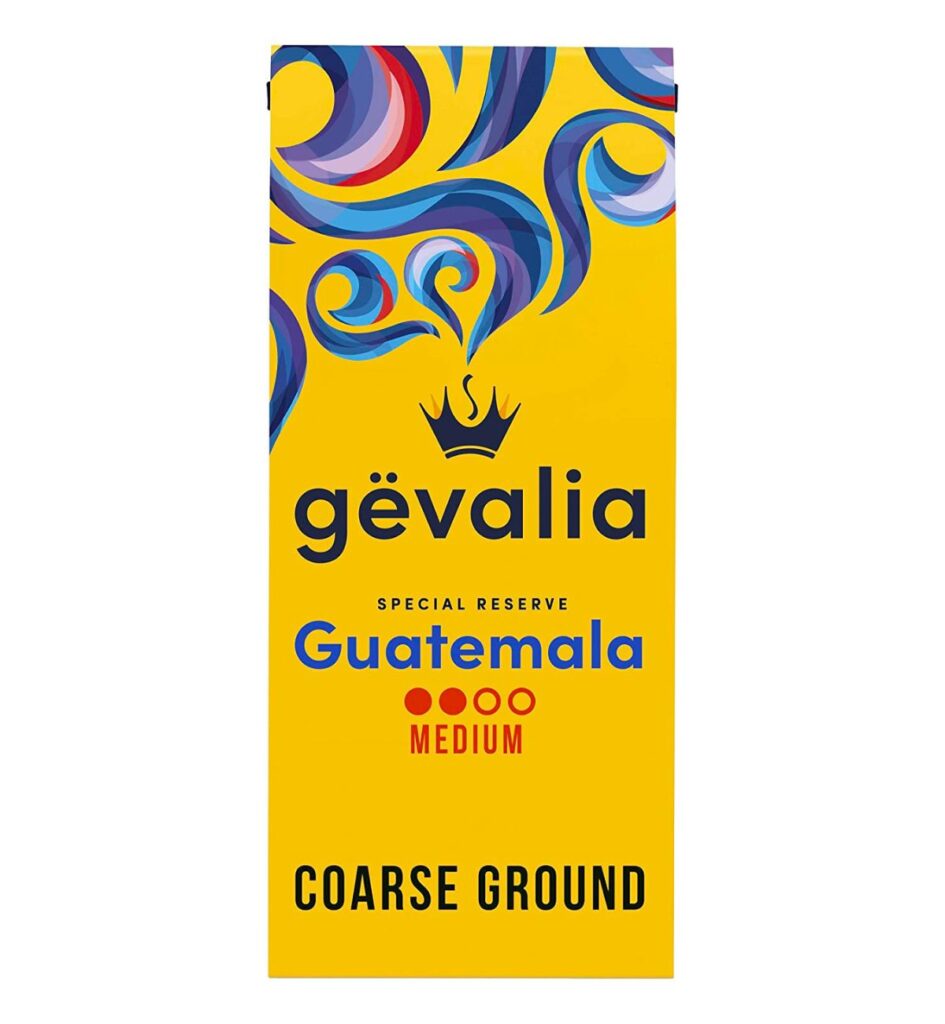
Gevalia Special Reserve Guatemala Single Origin is one of the best coarse ground coffees for making a great cup of percolator coffee. This special reserve blend is carefully sourced from small farms in Guatemala, providing a unique flavor that can’t be found anywhere else.
It has a medium roast with notes of cocoa, caramel, and hazelnut, creating an exceptionally smooth and well-balanced cup. Plus, it’s pre-ground to the perfect coarseness for optimal extraction when using a percolator.
This coffee provides an easy way to make your favorite morning beverages without sacrificing taste or quality. It comes in convenient pre-ground bags and features vacuum-sealed packaging to ensure freshness with every brew.
Pros
- Rich and aromatic flavor.
- Coarse ground for optimal extraction.
- Medium roast enhances the aroma and sweetness of the coffee.
- Sustainable farming practices used to produce the beans for the coffee.
Cons
- Fairly expensive compared to other coffees on the market.
- Limited availability – only in pre-ground bags, not generally sold in whole bean form.
- It may require more grounds due to the coarser grind size.
Best Colombian coffee for the percolator
Eight O’Clock Coffee 100% Colombian Peaks & Arabica, Medium Roast
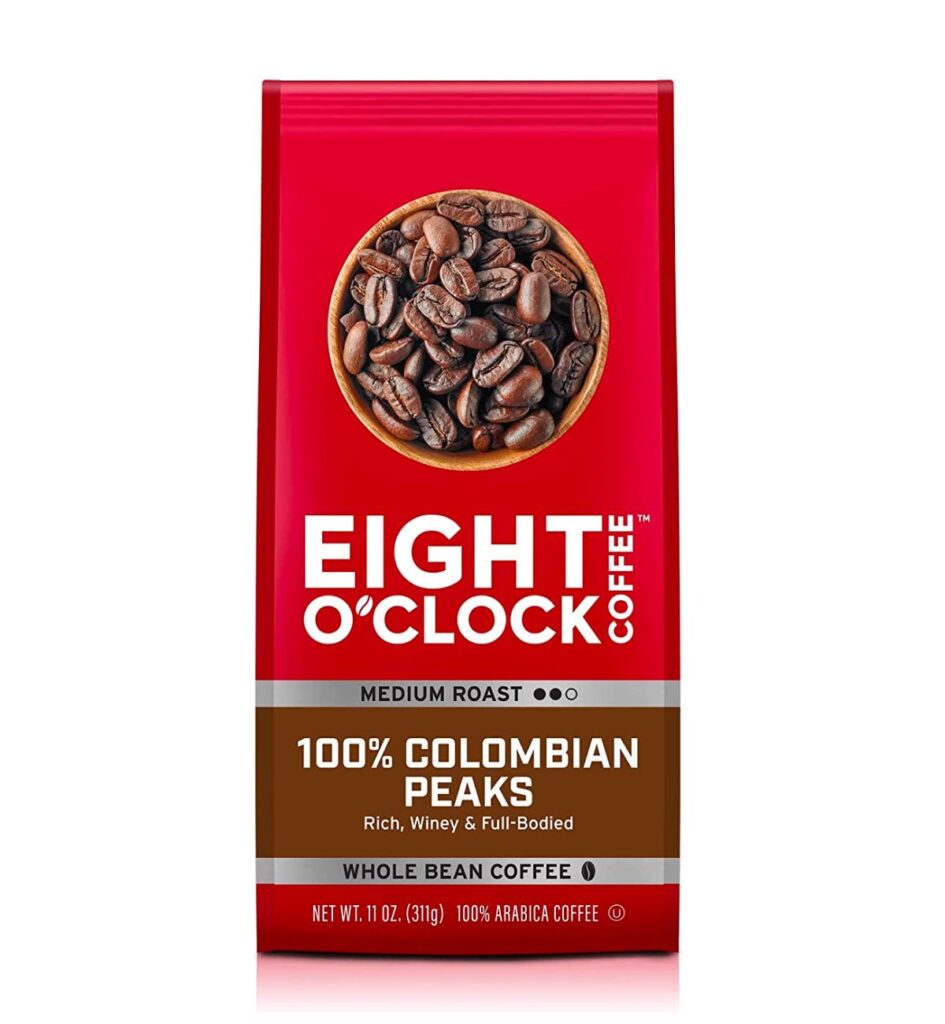
Eight O’Clock Coffee has recently released its 100 Colombian Peaks & Arabica Medium Roast Whole Bean Kosher Certified coffee. This is the perfect blend for those looking to get the most out of their percolator experience. Smooth and full-bodied while maintaining a delightful aroma, this Colombian roast will surely leave you feeling energized and refreshed.
Eight O’Clock coffee’s unique blend of medium roast Arabica beans from the high peaks of Colombia ensures that your cup will always be balanced and flavorful. With its light-medium body and hints of cocoa, spice, citrus zest, and nutty notes in every sip—it’s no wonder why it’s becoming one of the best coffees for percolators around! Plus, it’s certified kosher so that everyone can enjoy guilt-free daily cups.
Pros
- Medium roast yields a full-bodied cup of coffee with subtle sweetness and fruity tones.
- Certified Kosher for those observing Jewish dietary laws.
- Whole bean allows customized grind size, perfect for any brewing method.
- Available in various sizes to suit any preference or budget.
Cons
- Limiting the range of flavors offered by this particular product.
- Low acidity may not be suitable for those with sensitive stomachs or digestive issues.
- Only available online or through select retailers.
The best pre-ground coffee for the percolator
Fresh Roasted Coffee, Costa Rican Tarrazu, Medium Roast, Kosher, Ground
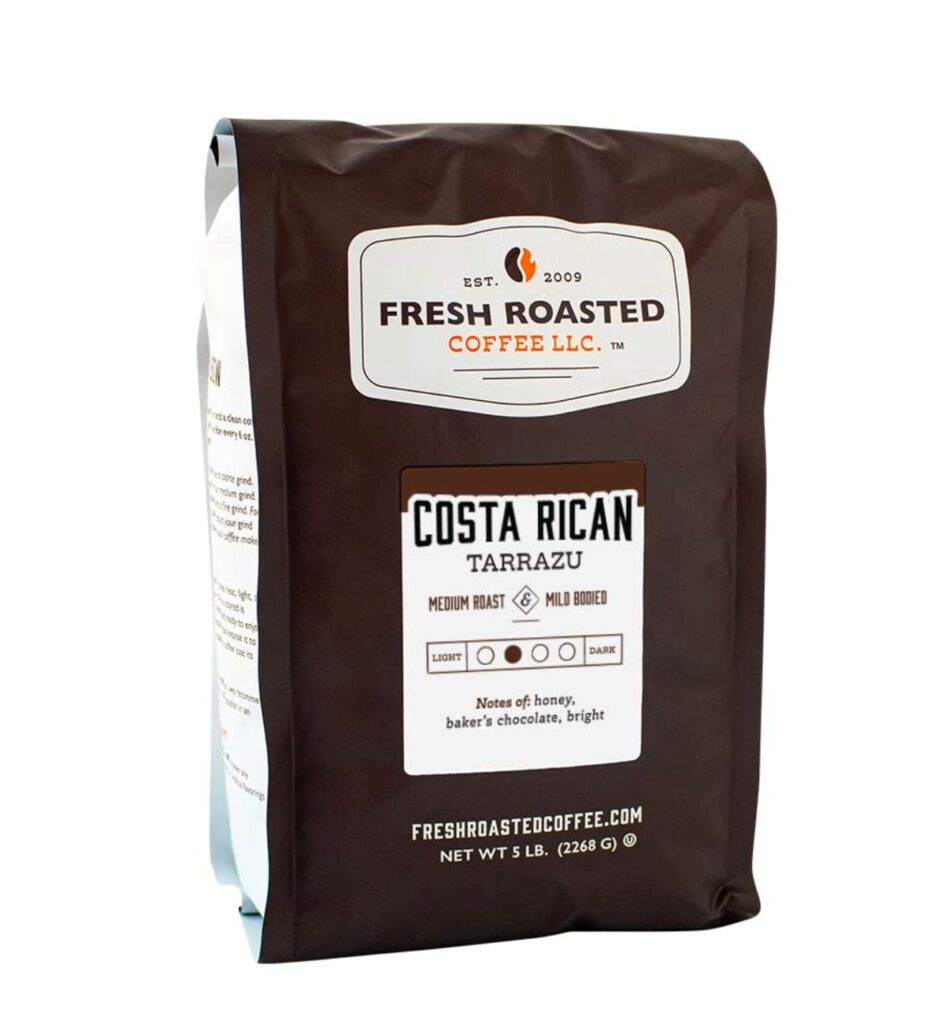
Brewing the perfect cup of coffee requires the right ingredients and proper technique. Pre-ground coffee is a great way to get the exact flavor you’re looking for. Costa Rican Tarrazu, medium roast, ground, Kosher certified freshly roasted coffee is one such ingredient that will surely provide a flavorful experience when used in a percolator.
This particular blend of freshly roasted beans from Costa Rica contains a pleasingly smooth acidity with complex layers of fruity flavors combined with deep cocoa notes. The medium roast provides a bold flavor profile that strikes the perfect balance between strength and smoothness, making it an excellent choice for those looking to enjoy their morning cup in an old-fashioned percolator. Additionally, this coffee is Kosher certified, so people can enjoy it by following different dietary restrictions.
Pros
- Medium roast provides a balanced and smooth flavor.
- Kosher certified for those who follow specific diets.
- Fresh roasted with rich aromas that enhance the experience.
- Costa Rican Tarrazu is known for its smooth, sweet taste.
Cons
- Ground coffee has a shorter shelf-life than whole-bean coffee.
- The bag size may be too large for some households.
Medium roast coarse ground coffee for the percolator
Tim Hortons Coarse Grind Original Blend
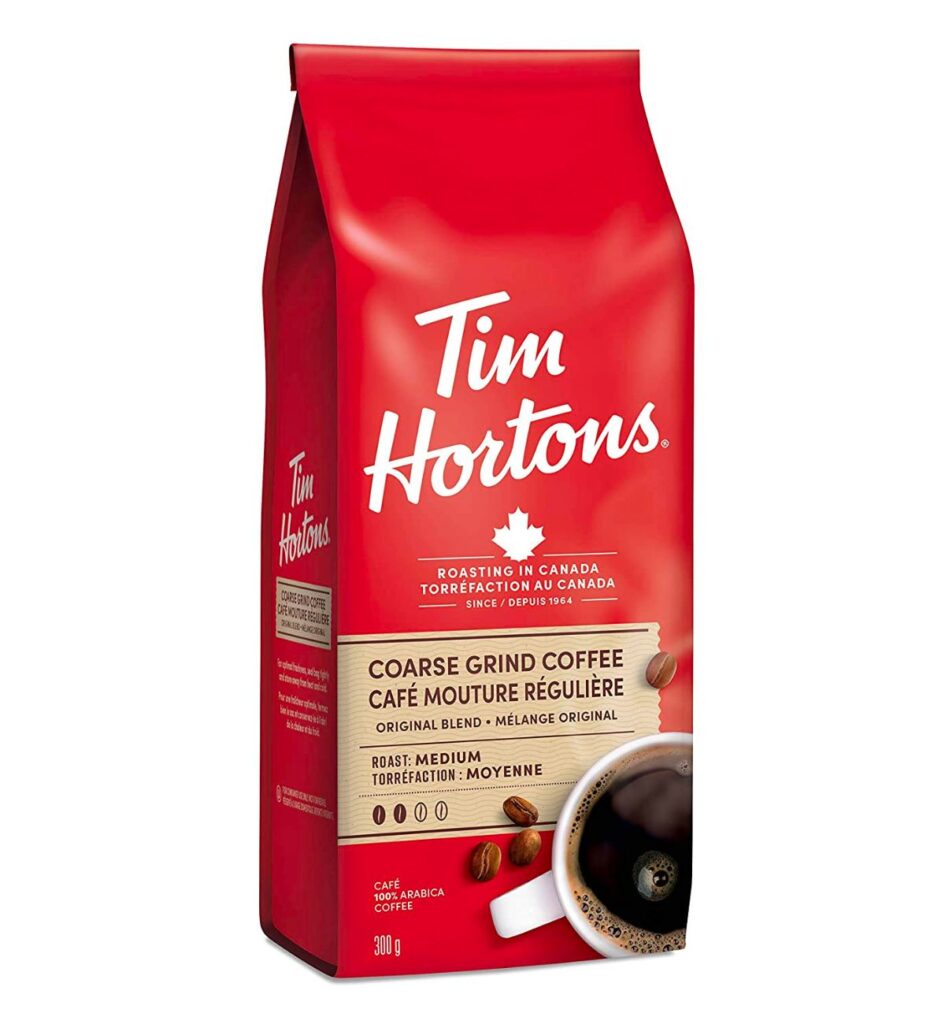
Tim Hortons Coarse Grind Original Blend is the perfect choice for those looking for a medium roast, coarse-ground coffee. This special blend was created to provide traditional percolator users with a bold yet smooth flavor profile that will please even the most discerning coffee drinkers.
It has been crafted to produce an easy-to-brew cup of coffee with a consistently gratifying taste on every brew. The combination of its medium roast and coarse grind allows it to slowly infuse flavor into each cup, making it ideal for use in stovetop or electric percolators. The result is a full-bodied yet mild cup of coffee that can be enjoyed any time of the day – or night!
Pros
- Tim Hortons Original Blend is strong and full-bodied.
- The coarse grind allows for more surface area to extract flavor from the beans.
- The blend contains Arabica beans with a pleasing acidity and sweet flavor profile.
Cons
- It is more widely available in North America.
- The blend contains Robusta beans which can impart an unpleasant bitterness.
Best whole bean coffee for the percolator
Starbucks Espresso Dark Roast Whole Bean Coffee
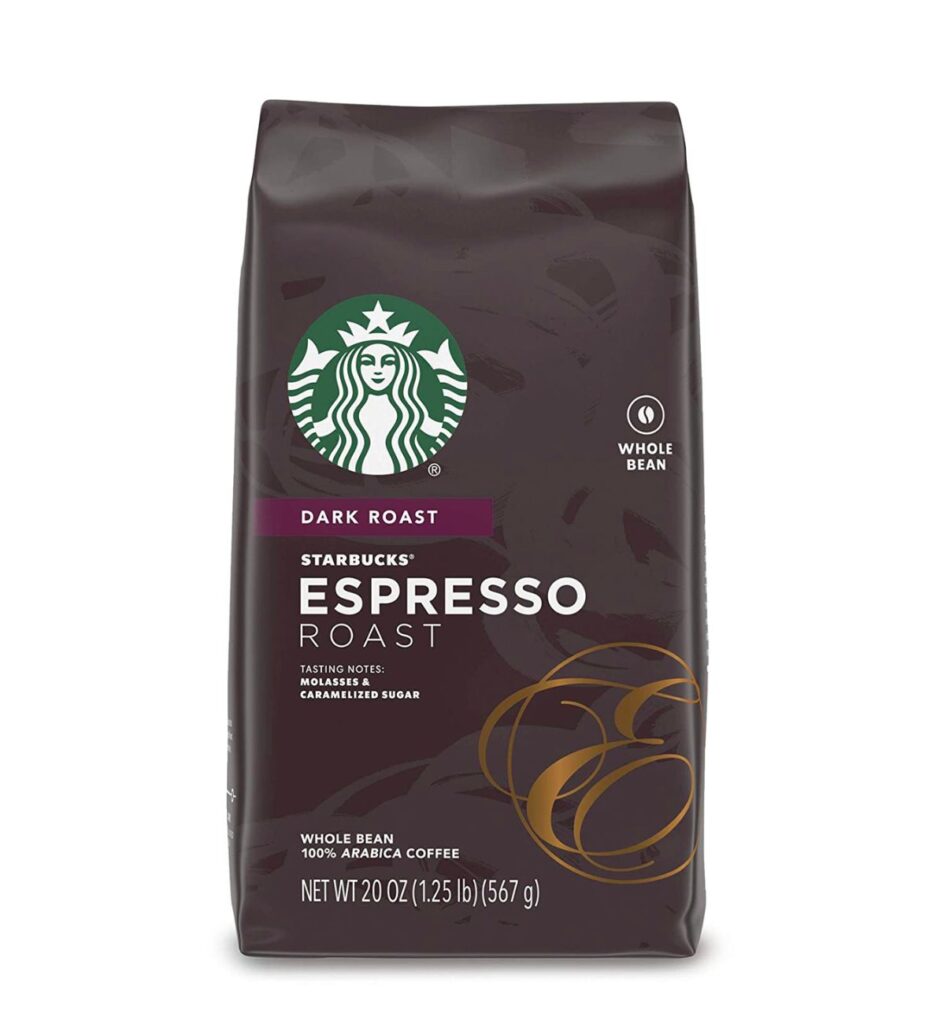
Starbucks Espresso Dark Roast Whole Bean Coffee is the best whole-bean coffee for percolators. It balances perfectly smooth, rich flavors with a dark roast intensity to give you a unique and delicious cup of coffee. The complex combination of bold espresso beans and subtle notes of chocolate will make your taste buds sing.
This blend’s full-bodied flavor and robust aroma make it perfect for use in a percolator or French press. The extra-dark roast gives you that extra kick while allowing all the flavor nuances to shine. You can also use it as a base for all your favorite espresso beverages like lattes, cappuccinos, and Americanos without compromising on taste or quality.
Pros
- Uses ethically sourced beans.
- Roasted to produce a rich and full-bodied flavor.
- Versatile for a variety of recipes or drinks.
- Very affordable price point.
Cons
- Limited availability in some regions.
- It can be too intense for some palates.
- It may only be suitable for some methods of coffee preparation.
Best for less bitterness coffee for the percolator
Grandes Cosechas, Gourmet Coffee, Whole Beans Espresso Roast
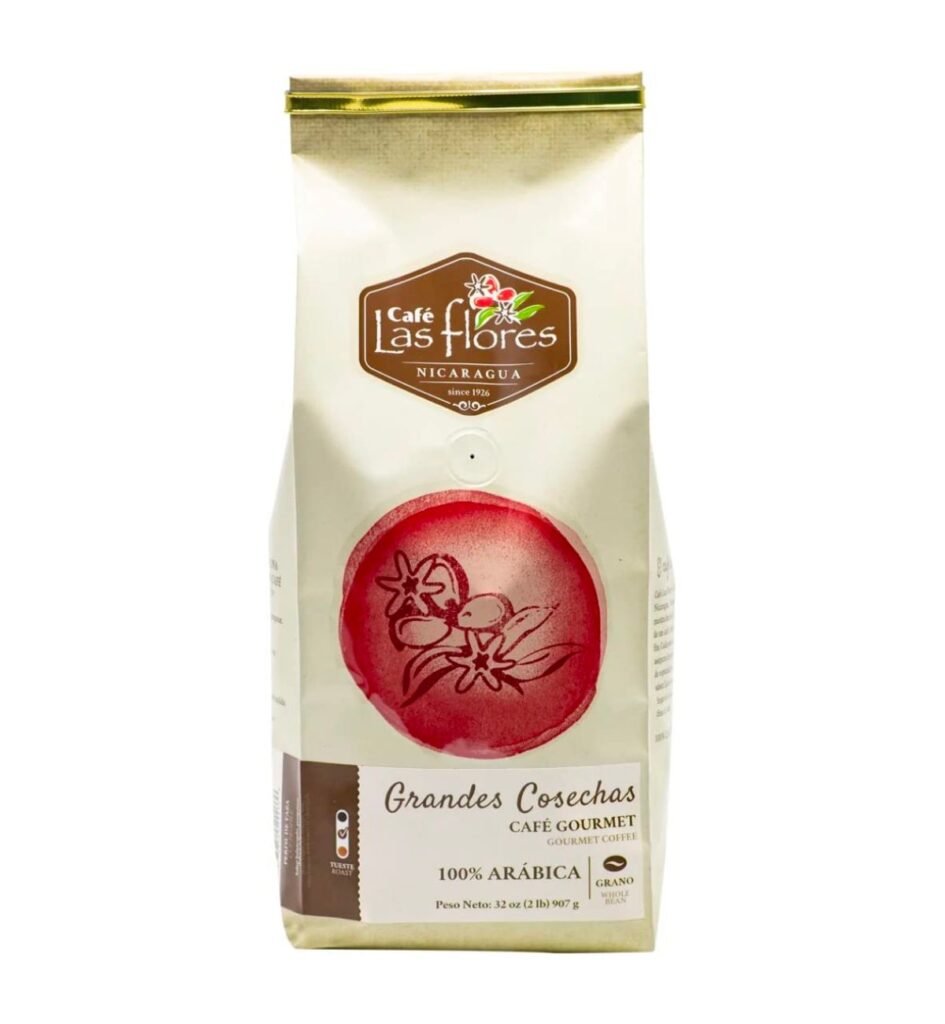
Grandes Cosechas Gourmet Coffee, Whole Beans Espresso Roast, 100 Arabica – Nicaragua’s Finest Coffee is the perfect choice for coffee connoisseurs who are looking for a coffee with a bold and full-bodied flavor. This superior blend is created from Nicaragua’s finest Arabica beans that are sourced from select farms located in some of the ideal climates for growing coffee.
With its smooth texture, this espresso roast has lower acidity and bitterness than other coffees, making it an excellent choice if you’re using a percolator to brew your favorite cup of joe. Experienced roasters have carefully crafted this Nicaraguan specialty to provide the best flavor possible while preserving all the essential components that make up a great cup of coffee.
Pros
- 100% Arabica beans from Nicaragua provide a rich and smooth flavor.
- Grandes Cosechas Gourmet Coffee is slow-roasted to bring out the best qualities.
- Whole beans retain more flavor than pre-ground coffee.
- The product is packaged in an airtight bag for freshness and convenience.
Cons
- Shipping costs may be high due to their origin in Nicaragua.
- Purchasing whole beans requires extra equipment for grinding them at home.
- Without proper storage techniques.
Our pick for the best coffee for the percolator
Kicking Horse Coffee, Three Sisters, Medium Roast, Whole Bean
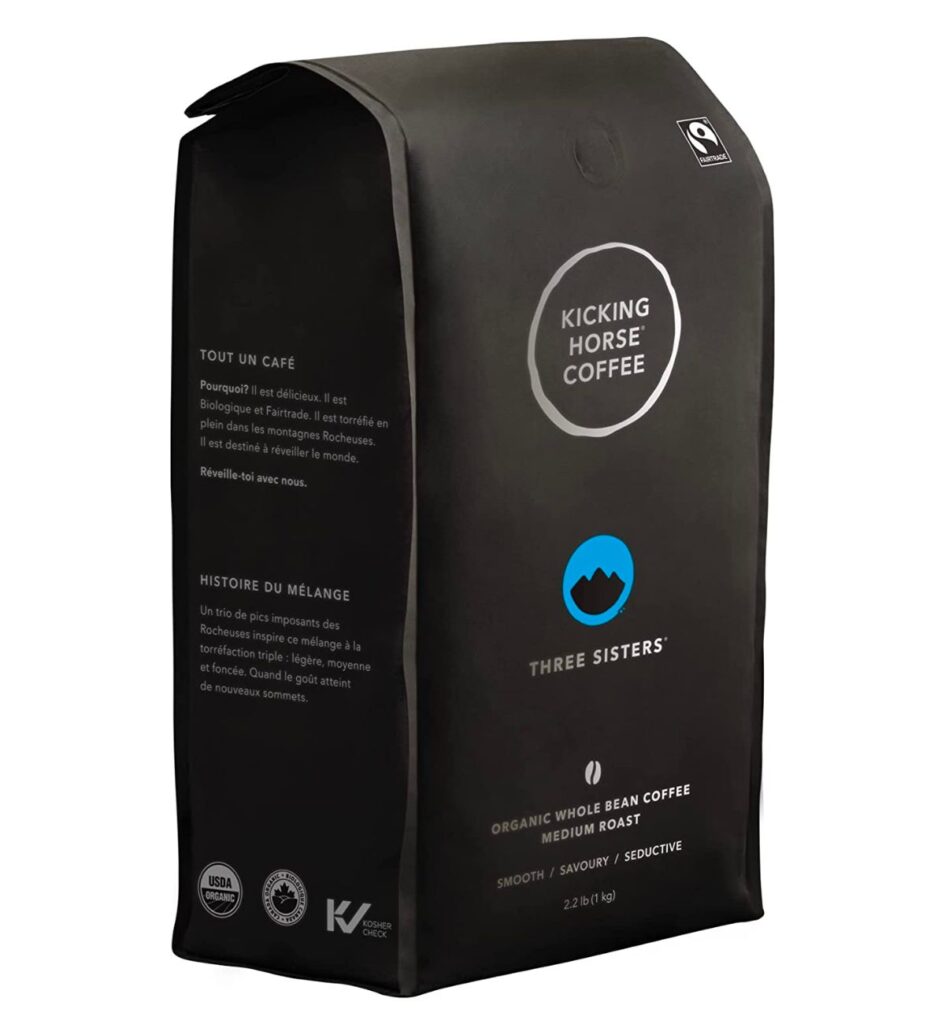
Kicking Horse Coffee will provide our top choice, made from whole bean coffee in Canada, the Kicking Horse medium roast, whole bean Three Sisters. This superb coffee offers a rich, soothing flavor with notes of chocolate and fruit. The flavor is bright and well-balanced without being overly robust.
Three Sisters is made from organic beans grown in Indonesia and South America. It is fair-trade certified, Organic, and kosher. Sold in a 2.2-pound bag, this mildly strong gourmet coffee is on the pricier side. We were disappointed by the quality of the coffee obtained from camping orders from Amazon, as some orders arrived several months old. We, however, agreed that this is the best brew for percolators.
Pros
- Certified organic ingredients ensure high-quality coffee.
- Medium roast provides a balanced flavor profile.
- Whole bean allows for customizing grind size and freshness.
- Kicking Horse Coffee is well-known for its rich, smooth taste.
Cons
- Not suitable for those preferring light or dark roasts.
- Higher price point than some others.
- Requires grinding beans before brewing.
Roast Profile & Grinding Size
The best type of coffee beans and roast profile to use in a percolator will largely depend on personal preference. Popular roasts for percolators include lighter to moderately dark roasts. It is important to note that lighter roasts emphasize the origin characteristics of the coffee, whereas slightly darker roasts diminish those characteristics and provide more of a “baked” taste. When selecting a roast for a percolator, choose one that is not too light or too dark in order to achieve the best outcome.
In addition to selecting the right roast type, you must also be sure to use appropriately ground beans when using a percolator. A coarse grind is most suitable since this allows water and heat to circulate evenly during the boiling process; too fine ground can also result in an over-extracted and bitter cup of coffee. If you prefer finer grounds, you may end up with better results by using a French press over boiling in a percolator.
Water Ratio
The ratio of coffee to water is crucial when making coffee with a percolator. Generally, one tablespoon of ground coffee per 2–3 cups of water is recommended for most percolator models. If the coffee tastes too strong or bitter, reduce the number of grounds to 1 tablespoon per 4 cups of water; if it’s too weak or too mild, increase it accordingly. Different types and origins of beans have different flavors and caffeine concentrations – so adjust the amounts to find what works best for each blend. Also, be sure to use cold filtered water for optimal brewing results.
Brewing Time & Temperature
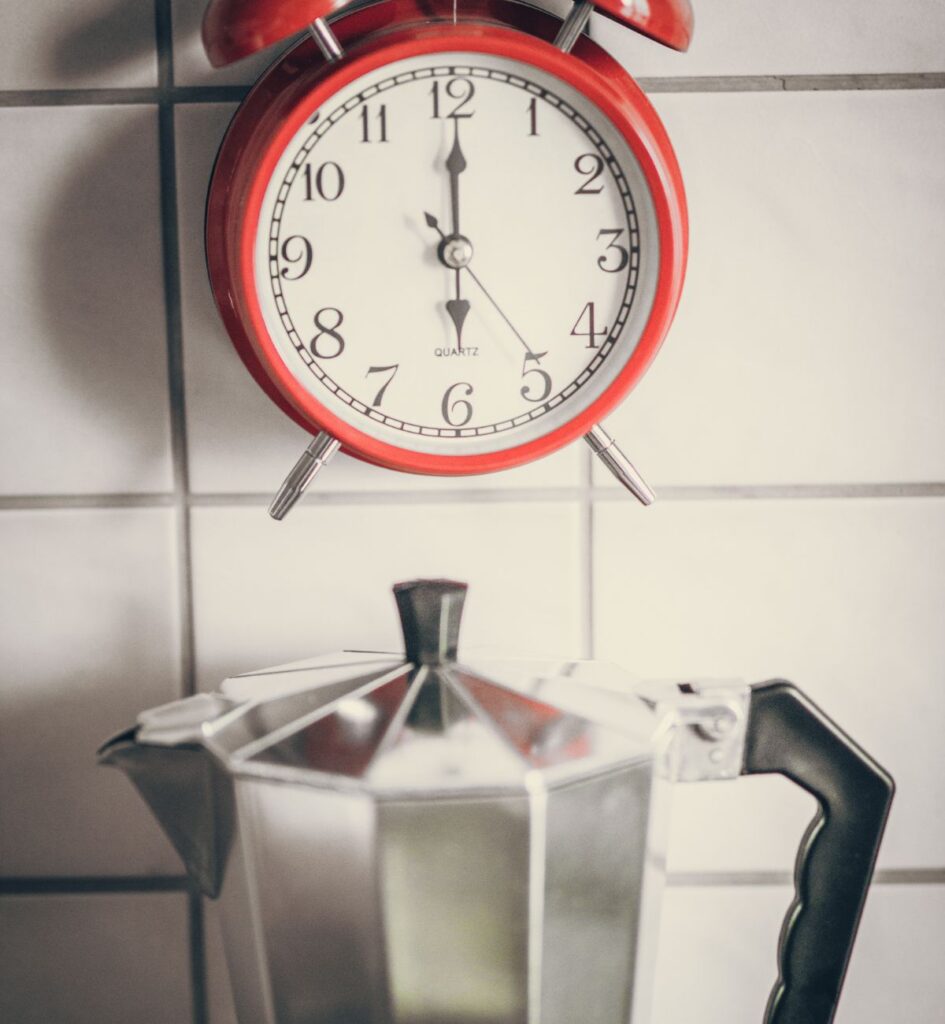
One of the critical aspects of correctly brewing coffee in a percolator is understanding and adjusting the brewing time and temperature. The key to achieving a flavorful cup of coffee is to match the brewing time and temperature with the type of grind used as well as personal taste preference.
Brewing time: For percolator brewed coffee, it is advisable to keep brewing time at most 10 minutes once it has reached its rolling boil. Any longer, you run the risk of burning the bitter oils extracted from the grounds, resulting in an over-extracted and acidic cup.
Temperature: A rolling (not boiling) brew temperature should be maintained for optimal flavor extraction from your ground beans, so be sure not to let it boil continuously throughout your cycle. The temperature should hover between 185°F – 205°F / 85°C – 96°C depending on how long you would like to extract oils from your grounds during that given brew cycle. At approximately 30 seconds after it has reached its rolling boil, or just prior to reaching 185°F / 85°C, take your percolator off the heat source; this will reduce further expansion in flavor notes due to over-extraction while still producing a bold but smooth cup with minimal acidity.
How to make a Great Cup of Coffee with a Percolator
Brewing coffee with a percolator is different from the modern pour-over or French press methods. Use a percolator, and coffee is brewed by continually cycling boiling hot water up a tube and through the coffee grounds over and over until the desired strength is reached. Taking care to use specific ratios of water to grounds, paying attention to temperature, and watching for saturation all make for a great cup of joe when using this classic brewing method.
Whether you’ve recently pulled an old percolator out from grandma’s attic or purchased an electric version from the store – here are some tips on how to make great coffee with your percolator:
- Start with cold, filtered water – It’s best to use filtered water as it will free your cup of coffee from any off tastes caused by chemicals usually found in tap water. Coldwater will work best in this situation (as opposed to hot) so that it can absorb the flavor more efficiently.
- Measure your grounds according to brew strength – Using boiled and cooled filtered water, fill your percolator reservoir halfway. Then, add one heaped tablespoon of medium-grounded beans for every 6 ounces (3/4 cup) of desired brew strength. For bolder flavors or less caffeine, slightly increase the ratio and decrease it for milder profiles or more caffeine.
- Use temperatures between 195 – 205 degrees Fahrenheit – If using an electric Percolator, adjust the heat setting appropriately. If using a stovetop, set the heating element low enough so that there is no bubbling noise when heating (this temperature can vary depending on how high above sea level you are).
- Do not allow saturation – There should never be dripping after each cycle as this can leave behind unwelcome minerals on top of your grounds which will eventually cause bad tastes in your cup. To prevent saturation, drop heat out after several drips have been heard during cycles and turn back up when needed again throughout the process until finished brewing time – usually 4-5 minutes max!
Buyer’s Guide: How to Select the Best Coffee for Percolator
The right type of coffee can make or break the success of a percolator brew, so it is important to know what to look for when choosing coffee for use in your percolator. Each type of roast will have its own distinct flavor, and it’s important to understand the key differences between light, medium and dark roasts so that you can find the one that works best for you. Here are a few factors you should consider when purchasing a coffee for a percolator.
- Roast type: Darker roasts tend to work best with percolators because they provide more intense flavors and a greater body than lighter roasts. The darker roast will also keep its flavor longer after cooling, which makes it ideal for brewing in percolators.
- Grind size: Percolators work best with medium-coarse grinds because they allow all of the grounds to be covered by water during the brew cycle while still maintaining adequate exposure relative to finer grinds, which could result in over-extracted flavors.
- Taste preferences: Some coffees are more suited to different brewing methods than others, so pay attention to how each roast tastes on its own before adding any spices or other ingredients. Additionally, light roasts tend to take on added flavors more quickly than darker ones; if you’re looking for something sweet or fruity-like blueberry muffin or pumpkin spice, you may opt for lighter roast varieties.
- Freshness: Coffee beans begin losing flavor as soon as they are roasted, so always buy freshly roasted beans from local distributors whenever possible. This ensures optimal taste and aroma retention during your final cup of coffee beverage.
Conclusion
In conclusion, there is no definitive type of coffee for a percolator, and it is up to each individual’s preferences. However, it is generally advised to use a medium roast that will deliver a smooth, balanced flavor as well as offer the strongest aroma. An Italian or French roast may be appropriate if a more structured flavor and texture are desired. Dark roasts are usually not recommended as they have a tendency to burn more easily and make the coffee taste bitter. No matter what roast you choose, it is best to buy freshly roasted coffee from a specialty shop in order to ensure its freshness and quality.
